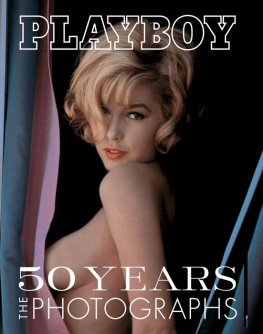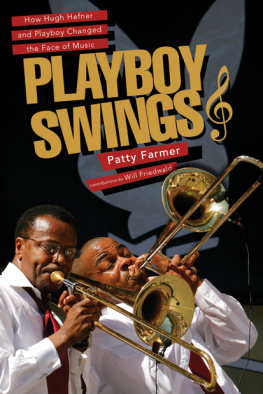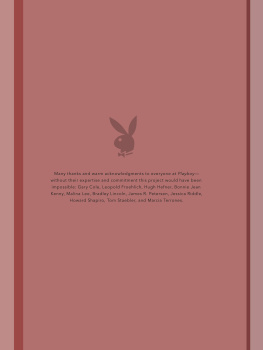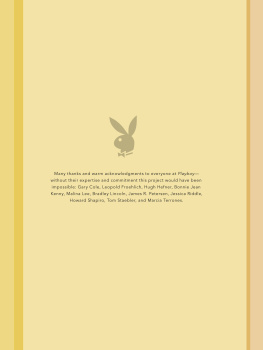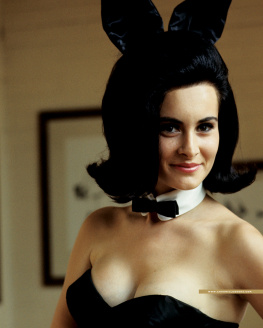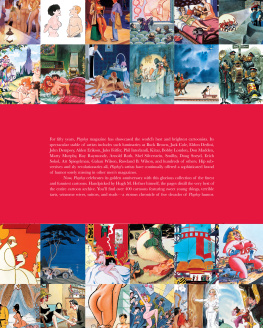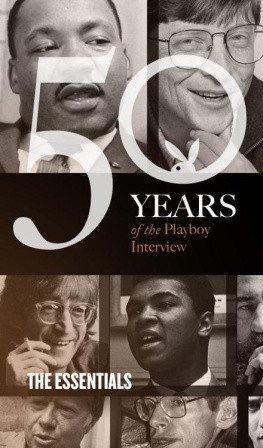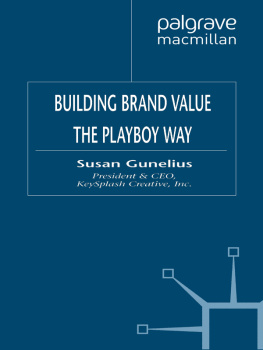Playboy - The Playboy Interview: Men of Letters: 50 Years
Here you can read online Playboy - The Playboy Interview: Men of Letters: 50 Years full text of the book (entire story) in english for free. Download pdf and epub, get meaning, cover and reviews about this ebook. year: 2012, publisher: Playboy Enterprises, Inc., genre: Detective and thriller. Description of the work, (preface) as well as reviews are available. Best literature library LitArk.com created for fans of good reading and offers a wide selection of genres:
Romance novel
Science fiction
Adventure
Detective
Science
History
Home and family
Prose
Art
Politics
Computer
Non-fiction
Religion
Business
Children
Humor
Choose a favorite category and find really read worthwhile books. Enjoy immersion in the world of imagination, feel the emotions of the characters or learn something new for yourself, make an fascinating discovery.

- Book:The Playboy Interview: Men of Letters: 50 Years
- Author:
- Publisher:Playboy Enterprises, Inc.
- Genre:
- Year:2012
- Rating:3 / 5
- Favourites:Add to favourites
- Your mark:
- 60
- 1
- 2
- 3
- 4
- 5
The Playboy Interview: Men of Letters: 50 Years: summary, description and annotation
We offer to read an annotation, description, summary or preface (depends on what the author of the book "The Playboy Interview: Men of Letters: 50 Years" wrote himself). If you haven't found the necessary information about the book — write in the comments, we will try to find it.
Playboy: author's other books
Who wrote The Playboy Interview: Men of Letters: 50 Years? Find out the surname, the name of the author of the book and a list of all author's works by series.
The Playboy Interview: Men of Letters: 50 Years — read online for free the complete book (whole text) full work
Below is the text of the book, divided by pages. System saving the place of the last page read, allows you to conveniently read the book "The Playboy Interview: Men of Letters: 50 Years" online for free, without having to search again every time where you left off. Put a bookmark, and you can go to the page where you finished reading at any time.
Font size:
Interval:
Bookmark:
CONTENTS
About the Book
Copyright 2012 Playboy Enterprises, Inc.
All rights reserved, including the right to reproduce this interview or portions thereof in any form whatsoever. For the full Playboy archiveincluding every Playboy Interview ever publishedvisit i.playboy.com .
About the Series: In mid-1962, Playboy founder Hugh Hefner was given a partial transcript of an interview with Miles Davis. It covered jazz, of course, but it also included Daviss ruminations on race, politics and culture. Fascinated, Hef sent the writerfuture Pulitzer Prizewinning author Alex Haley, an unknown at the timeback to glean even more opinion and insight from Davis. The resulting exchange, published in the September 1962 issue, became the first official Playboy Interview and kicked off a remarkable run of public inquisition that continues todayand that has featured just about every cultural titan of the last half century.
To celebrate the interviews 50th anniversary, the editors of Playboy have assembled 13 compilations of the magazines most (in)famous interviewsfrom big mouths and wild men to sports gods and literary mavericks. Here is our collection of 12 interviews with the most riveting writers.
Vladimir Nabokov, January 1964
Few authors of this generation have sparked more controversy with a single book than a former Cornell University professor with the resoundingly Russian name of Vladimir Vladimirovich Nabokov. Lolita, his brilliant tragicomic novel about the nonplatonic love of a middle-aged man for a 12-year-old nymphet, has sold 2,500,000 copies in the United States alone.
It has also been made into a top-grossing movie, denounced in the House of Commons, and banned in Austria, England, Burma, Belgium, Australia and even France. Fulminating critics have found it to be the filthiest book Ive ever read, exquisitely distilled sewage, corrupt, repulsive, dirty, decadent and disgusting. Champions of the book, in turn, have proclaimed it brilliantly written and one of the great comic novels of all time; while Nabokov himself has been compared favorably with every writer from Dostoievsky to Krafft-Ebing, and hailed by some as the supreme stylist in the English language today. Pedants have theorized that the book is actually an allegory about the seduction of the Old World by the Newor perhaps the New World by the Old. And Jack Kerouac, brushing aside such lascivious symbolism, has announced that it is nothing more than a classic old love story.
Whatever it is, Nabokov would seem to be incongruously miscast as its author. A reticent Russian-born scholar whose most violent passion is an avid interest in butterfly collecting, he was born in 1899 to the family of a wealthy statesman in St. Petersburg. Fleeing the country when the Bolsheviks seized power, he made his way to England, where he enrolled as an undergraduate at Trinity College in Cambridge. In the Twenties and Thirties he drifted between Paris and Berlin earning a spotty living as a tennis instructor and tutor in English and French; achieving a modest degree of fame as an author of provocative and luminously original short stories, plays, poems and book reviews for the migr press; and stirring praise and puzzlement with a trio of masterful novels in RussianInvitation to a Beheading, The Gift and Laughter in the Dark. Finding himself again a refugee when France fell to the Nazis in 1940, Nabokov emigrated with his wife to the United States, where he began his academic career as a research fellow at Harvards Museum of Comparative Zoology. Now writing in Englishin a style rich with inventive metaphors and teeming with the philosophical paradoxes, abstruse ironies, sly non sequiturs, multilingual puns, anagrams, rhymes and riddles which both illuminate and obscure his workhe produced three more novels during his subsequent years as a professor in Russian and English literature at Wellesley, and then at Cornell. First came Bend Sinister, an unsettling evocation of life under a dictatorship; then Pnin, the poignant, haunting portrait of an aging migr college instructor; and finally the erotic tour de force which was to catapult him almost overnight to worldwide eminenceLolita.
This brief recital of biographical facts, however, outlines only the visible Nabokov, revealing nothing of the little-known interior man; for the labyrinth of his creative intellect has remained a hall of mirrors to all who have attempted to explore it. And his amused indifference to the most erudite appraisal of his work and worth has served merely to enhance the legend of his inscrutability. Shunning personal publicity, he grants interviews only rarelyhaving consented to see Playboy only after satisfying himself that the subjects we proposed to discuss were worthy of his attention.
Tweedy, bespectacled, absent-mindedly professorial in mien, the 64-year-old author greeted our interviewer, freelance writer Alvin Toffler, at the door of Nabokovs quiet apartment on the sixth floor of an elegant old hotel on the banks of Switzerlands Lake Geneva, where he has lived and worked for the past four yearsmost recently producing Pale Fire, the extraordinary story of a gifted poet as seen darkly through the eyes of his demented editor; and a belated English translation of The Gift. In a week-long series of conversations which took place in his study, Nabokov parried our questions with a characteristic mixture of guile, candor, irony, astringent wit and eloquent evasiveness. Speaking in a curiously ornate and literary English lightly tinctured with a Russian accent, choosing his words with self-conscious deliberation, he seemed somewhat dubious of his ability to make himself understoodor perhaps skeptical about the advisability of doing so. Despite the good humor and well-bred cordiality which marked our meetings, it was as though the shadowed universe within his skull was forever beckoning him away from a potentially hostile world outside. Thus his conversation, like his fictionin which so many critics have sought vainly to unearth autobiographyveils rather than reveals the man; and he seems to prefer it that way. But we believe our interview offers a fascinating glimpse of this multileveled genius.
Playboy: With the American publication of Lolita in 1958, your fame and fortune mushroomed almost overnight from high repute among the literary cognoscentiwhich you had enjoyed for more than 30 yearsto both acclaim and abuse as the world-renowned author of a sensational best seller. In the aftermath of this cause clbre, do you ever regret having written Lolita ?
Nabokov: On the contrary, I shudder retrospectively when I recall that there was a moment, in 1950, and again in 1951, when I was on the point of burning Humbert Humberts little black diary. No, I shall never regret Lolita . She was like the composition of a beautiful puzzleits composition and its solution at the same time, since one is a mirror view of the other, depending on the way you look. Of course she completely eclipsed my other worksat least those I wrote in English: The Real Life of Sebastian Knight, Bend Sinister, my short stories, my book of recollections; but I cannot grudge her this. There is a queer, tender charm about that mythical nymphet.
Playboy: Though many readers and reviewers would disagree that her charm is tender, few would deny that it is queerso much so that when director Stanley Kubrick proposed his plan to make a movie of Lolita , you were quoted as saying, Of course theyll have to change the plot. Perhaps they will make Lolita a dwarfess. Or they will make her 16 and Humbert 26. Though you finally wrote the screenplay yourself, several reviewers took the film to task for watering down the central relationship. Were you satisfied with the final product?
Nabokov: I thought the movie was absolutely first-rate. The four main actors deserver the very highest praise. Sue Lyon bringing that breakfast tray or childishly pulling on her sweater in the carthese are moments of unforgettable acting and directing. The killing of Quilty is a masterpiece, and so is the death of Mrs. Haze. I must point out, though, that I had nothing to do with the actual production. If I had, I might have insisted on stressing certain things that were not stressedfor example, the different motels at which they stayed. All I did was write the screenplay, a preponderating portion of which was used by Kubrick.
Font size:
Interval:
Bookmark:
Similar books «The Playboy Interview: Men of Letters: 50 Years»
Look at similar books to The Playboy Interview: Men of Letters: 50 Years. We have selected literature similar in name and meaning in the hope of providing readers with more options to find new, interesting, not yet read works.
Discussion, reviews of the book The Playboy Interview: Men of Letters: 50 Years and just readers' own opinions. Leave your comments, write what you think about the work, its meaning or the main characters. Specify what exactly you liked and what you didn't like, and why you think so.

